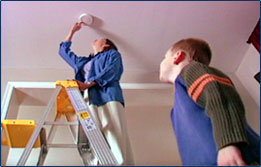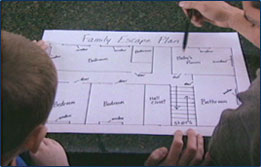
Focus on Fire: Preparedness
September is National Preparedness Month. Citizens would benefit from learning how to be ready in case of natural or man-made disasters. Preparing in advance can lessen or eliminate deaths, injuries, and property damage. In most types of disasters the risk for fire is increased due to loose electrical wires, broken gas lines, flooding, or the lack of electricity. In addition, fires in residences are a personal disaster striking hundreds of thousands of homes each year. For these reasons, each of us should take the time to find out how to be prepared.
The following information will assist you and your family in taking the important steps necessary to prepare for the possibility of fire in your home.

Families can dramatically increase their chances of surviving a fire simply by installing and maintaining working smoke alarms.
Smoke Alarms
Fires can occur in a variety of ways and in any room of your home. But no matter where or how, having a smoke alarm is the first key step towards your family’s safety. A smoke alarm stands guard around the clock and, when it first senses smoke, it sounds a shrill alarm. This often allows a family the precious but limited time it takes to escape.
Properly installed and maintained smoke alarms are considered to be one of the best and least expensive means of providing an early warning of a potentially deadly fire and could reduce the risk of dying from a fire in your home by almost half.
Read More About Smoke Alarms »
Residential Fire Sprinklers
Smoke alarms can only alert you and your family to a fire in the home – they cannot contain or extinguish a fire. Residential sprinkler systems can!
Using quick response sprinklers and approved piping, homes can be built or even retrofitted to include low-cost automatic sprinkler systems connected to the domestic water supply.
Most importantly, sprinklers give occupants extra time to escape from a burning home.
Read More About Residential Fire Sprinklers »

Children as young as three years old can follow a fire escape plan they have practiced often. Yet, many families don't have detailed escape plans, and those that do usually don't practice them.
Escape Plans
In the event of a fire, remember – time is the biggest enemy and every second counts! Escape plans help you get out of your home quickly. In less than 30 seconds a small flame can get completely out of control and turn into a major fire.
It is important to:
- Practice your escape plan every month.
- Plan two ways out of every room.
- Leave your home when a fire occurs.
- Designate a meeting place away from your home.
- Get out and stay out! Never return to a burning building!
Read More About Escape Plans »
Fire Extinguishers
The use of a fire extinguisher in the hands of a trained adult can be a life and property saving tool. However, a majority of adults have not had fire extinguisher training and may not know how and when to use them. Fire extinguisher use requires a sound decision making process and training on their proper use and maintenance.
Should I Use a Fire Extinguisher?
Sound Decision Making. Training. Maintenance.
All are required to safely control a fire with an extinguisher. For this reason, USFA recommends that only those trained in the proper use and maintenance of fire extinguishers consider using them when appropriate.
Home Fire Prevention Tips
You can prevent the loss of life and property resulting from fire by being able to identify potential hazards and following the safety tips contained in the factsheets below.
What if a Fire Occurs? – After a Fire
Not only is it important to prepare for the risk of fire, but it is also important to prepare for the aftermath should one occur. The following checklist serves as a quick reference and guide for you to follow after a fire strikes.
- Contact your local disaster relief service, such as the Red Cross, if you need temporary housing, food and medicines.
- If you are insured, contact your insurance company for detailed instructions on protecting the property, conducting inventory and contacting fire damage restoration companies. If you are not insured, try contacting private organizations for aid and assistance.
- Check with the fire department to make sure your residence is safe to enter. Be watchful of any structural damage caused by the fire.
- The fire department should see that utilities are either safe to use or are disconnected before they leave the site. DO NOT attempt to reconnect utilities yourself.
- Conduct an inventory of damaged property and items. Do not throw away any damaged goods until after an inventory is made.
- Try to locate valuable documents and records. Refer to information on replacing documents and records.
- If you leave your home, contact the local police department to let them know the site will be unoccupied.
- Begin saving receipts for any money you spend related to fire loss. The receipts may be needed later by the insurance company and for verifying losses claimed on income tax.
- Notify your mortgage company of the fire.
- Check with an accountant or the Internal Revenue Service about special benefits for people recovering from fire loss.

Create a Family Disaster Plan, Emergency Supply Kit
Fire (particularly wildfire) and other types of disasters – hurricane, flood, tornado, earthquake, hazardous materials spill, winter storm – can strike quickly and without warning. You can cope with disaster by preparing in advance and working together.
For more information on preparedness for natural and man-made disasters, and National Preparedness Month 2008, please visit Ready.gov.
Related Topics
- Earthquakes and Fire Safety
- Flood Fire Safety
- Hurricane/Tornado Fire Safety
- Summer Storm Fire Safety
- Winter Fire Safety
Related Publications
- After the Fire – Returning to Normal (PDF, 140 Kb)
- Protecting Your Family from Fire (PDF, 1.4 Mb)

